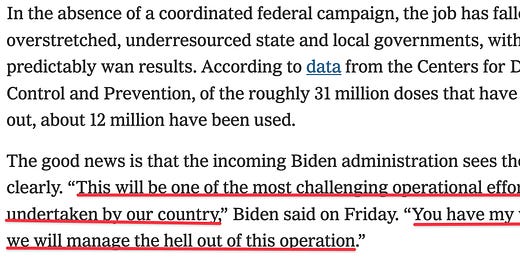T2B54: Viden 8
In previous updates, I have shared the thought that Biden’s best shot at success is to replace drama with competence, i.e., the opposite of Trump.
Another way of thinking about it: there are two poles in the US right now, both surging in popularity. One is the MAGA camp - I don’t want to call it an ideology since it deals more with emotions than with beliefs - and the other is a progressive cluster that believes in social justice.
Biden will want to differentiate himself from both of these poles with a no fuss administration backed by a technocratic message: we will solve the problems of American society through well run operations and programs backed by the federal government.
It’s undoubtedly neoliberal - perhaps we might call it compassionate neoliberalism in homage to Dubya’s famous claim to compassionate conservatism (which ended with millions dead in Afghanistan and Iraq, but never mind) - in which the process of governance takes precedence over the ideology of governance.
The vaccine rollout offers the perfect challenge to this framing of government as mechanics: if done well - quickly, fairly, thoroughly - the rollout will greatly expand the legitimacy of compassionate neoliberalism (CN for short). The task of hitting the ground running is going to fall on the shoulders of Jeff Zients.
Zients has the perfect CN resume: prep school, BA at Duke, founding partner at investment funds as well as responsible for salvaging the Obama administration’s reputation after the healthcare.gov debacle. He is the embodiment of the system at its competent best. This is the kind of person who would have worked for the CIA in the fifties and sixties out of patriotism but also administered justice fairly in whatever imperial outpost he was sent to.
Will it work?
That remains to be seen, but I also want to point out that for many so called ‘wicked problems’ we ‘know’ what needs to be done but aren’t able to do it, so there’s a problem with our form of knowledge. Consider climate change - we know that we need to reduce the amount the carbon in the atmosphere, but we aren’t able to gather the institutional will to do so.
Why not?
I can imagine two possible answers to that question:
It’s just a matter of removing the obstacles to the existing system. In other words, we have adequate knowledge and there are only ‘political’ obstacles to turning that knowledge into action, and therefore, shift the politics (say, by winning elections) and you set the machine in motion. This is the Biden administration’s view and more generally, the view of the neoliberal mainstream.
There are deeper epistemological problems, where we have been blinded by the success of scientific knowledge into thinking that we already have the tools to solve wicked problems. I am of this persuasion.
Nevertheless, the debate between these two points and the potential truth of point 2 above leads to a reframing of the relationship between knowledge, power and society.
Ever since the 19th century, there’s been this demand for a ‘scientific’ theory of society which satisfies the inscription on Marx’s gravestone (from the theses of Feuerbach):
The philosophers have only interpreted the world in various ways • the point however is to change it".
The neoliberal system embodies a theory of change which emphasizes organizational competence, efficiency and data. Is that enough?






